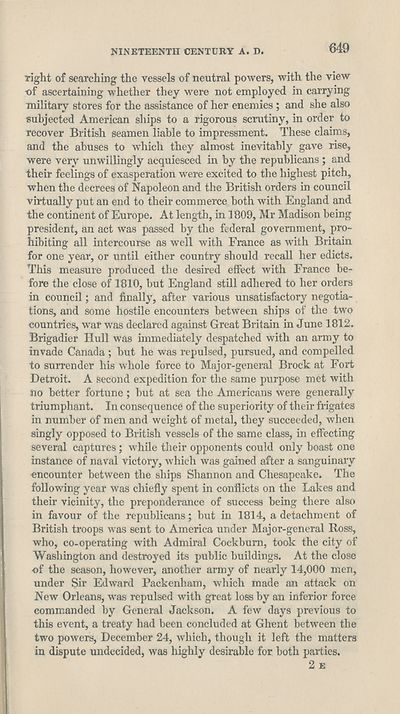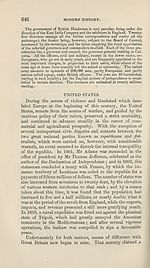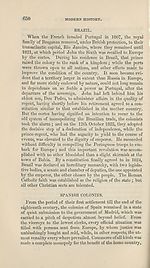Download files
Complete book:
Individual page:
Thumbnail gallery: Grid view | List view

NINETEENTH CENTURY A. D.
649
Tight of searching the vessels of neutral powers, with the view
of ascertaining whether they were not employed in carrying
military stores for the assistance of her enemies; and she also
subjected American ships to a rigorous scrutiny, in order to
recover British seamen liable to impressment. These claims,
and the abuses to which they almost inevitably gave rise,
were very unwillingly acquiesced in by the republicans; and
their feelings of exasperation were excited to the highest pitch,
when the decrees of Napoleon and the British orders in council
virtually put an end to their commerce both with England and
the continent of Europe. At length, in 1809, Mr Madison being
president, an act was passed by the federal government, pro¬
hibiting all intercourse as well with France as with Britain
for one year, or until either country should recall her edicts.
This measure produced the desired effect with France be¬
fore the close of 1810, but England still adhered to her orders
in council; and finally, after various unsatisfactory negotia¬
tions, and some hostile encounters between ships of the two
countries, war was declared against Great Britain in June 1812.
Brigadier Hull was immediately despatched with an army to
invade Canada ; but he was repulsed, pursued, and compelled
to surrender his whole force to Major-general Brock at Fort
Detroit. A second expedition for the same purpose met with
no better fortune; but at sea the Americans were generally
triumphant. In consequence of the superiority of their frigates
in number of men and weight of metal, they succeeded, when
singly opposed to British vessels of the same class, in effecting
several captures; while their opponents could only boast one
instance of naval victory, which was gained after a sanguinary
encounter between the ships Shannon and Chesapeake. The
following year was chiefly spent in conflicts on the Lakes and
their vicinity, the preponderance of success being there also
in favour of the republicans; but in 1814, a detachment of
British troops was sent to America under Major-general Ross,
who, co-operating with Admiral Cockbum, took the city of
Washington and destroyed its public buildings. At the close
of the season, however, another army of nearly 14,000 men,
under Sir Edward Packenham, which made an attack on
New Orleans, was repulsed with great loss by an inferior force
commanded by General Jackson. A few days previous to
this event, a treaty had been concluded at Ghent between the
two powers, December 24, which, though it left the matters
in dispute undecided, was highly desirable for both parties.
649
Tight of searching the vessels of neutral powers, with the view
of ascertaining whether they were not employed in carrying
military stores for the assistance of her enemies; and she also
subjected American ships to a rigorous scrutiny, in order to
recover British seamen liable to impressment. These claims,
and the abuses to which they almost inevitably gave rise,
were very unwillingly acquiesced in by the republicans; and
their feelings of exasperation were excited to the highest pitch,
when the decrees of Napoleon and the British orders in council
virtually put an end to their commerce both with England and
the continent of Europe. At length, in 1809, Mr Madison being
president, an act was passed by the federal government, pro¬
hibiting all intercourse as well with France as with Britain
for one year, or until either country should recall her edicts.
This measure produced the desired effect with France be¬
fore the close of 1810, but England still adhered to her orders
in council; and finally, after various unsatisfactory negotia¬
tions, and some hostile encounters between ships of the two
countries, war was declared against Great Britain in June 1812.
Brigadier Hull was immediately despatched with an army to
invade Canada ; but he was repulsed, pursued, and compelled
to surrender his whole force to Major-general Brock at Fort
Detroit. A second expedition for the same purpose met with
no better fortune; but at sea the Americans were generally
triumphant. In consequence of the superiority of their frigates
in number of men and weight of metal, they succeeded, when
singly opposed to British vessels of the same class, in effecting
several captures; while their opponents could only boast one
instance of naval victory, which was gained after a sanguinary
encounter between the ships Shannon and Chesapeake. The
following year was chiefly spent in conflicts on the Lakes and
their vicinity, the preponderance of success being there also
in favour of the republicans; but in 1814, a detachment of
British troops was sent to America under Major-general Ross,
who, co-operating with Admiral Cockbum, took the city of
Washington and destroyed its public buildings. At the close
of the season, however, another army of nearly 14,000 men,
under Sir Edward Packenham, which made an attack on
New Orleans, was repulsed with great loss by an inferior force
commanded by General Jackson. A few days previous to
this event, a treaty had been concluded at Ghent between the
two powers, December 24, which, though it left the matters
in dispute undecided, was highly desirable for both parties.
Set display mode to:
![]() Universal Viewer |
Universal Viewer | ![]() Mirador |
Large image | Transcription
Mirador |
Large image | Transcription
| Antiquarian books of Scotland > Education > Elements of universal history on a new and systematic plan > (669) |
|---|
| Permanent URL | https://digital.nls.uk/127588168 |
|---|
| Description | Thousands of printed books from the Antiquarian Books of Scotland collection which dates from 1641 to the 1980s. The collection consists of 14,800 books which were published in Scotland or have a Scottish connection, e.g. through the author, printer or owner. Subjects covered include sport, education, diseases, adventure, occupations, Jacobites, politics and religion. Among the 29 languages represented are English, Gaelic, Italian, French, Russian and Swedish. |
|---|

